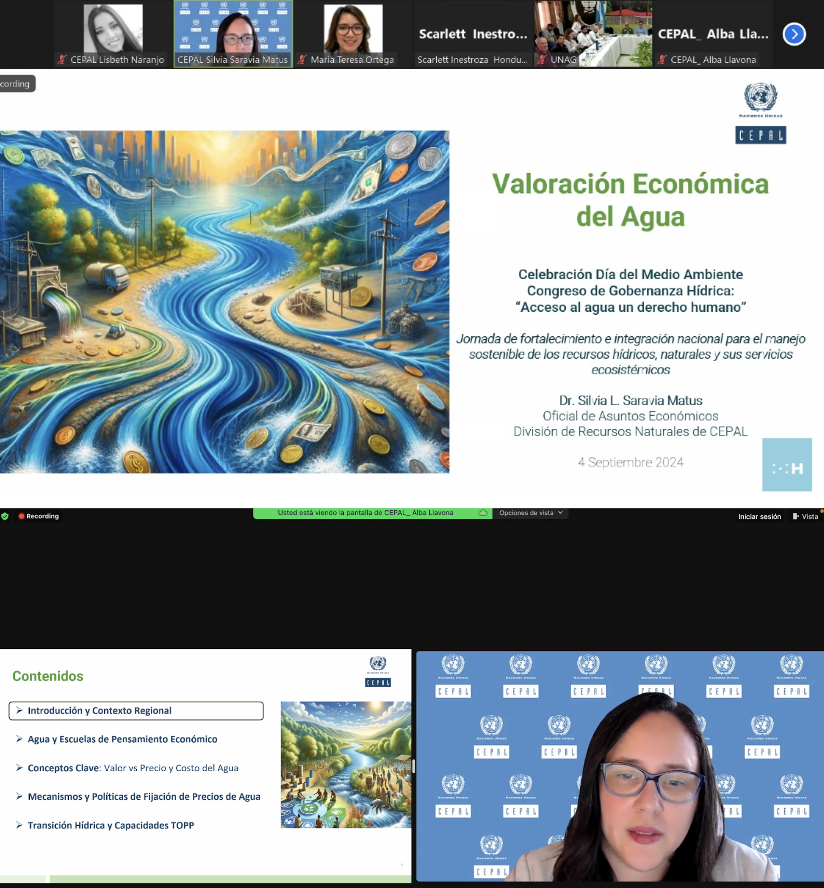Participation of ECLAC in the Water Governance Congress: "Access to Water, a Human Right"
Work area(s)
Topic(s)
On September 4th, 2024, the Water Governance Congress: "Access to Water, a Human Right" was held, organized by the Secretariat of Natural Resources and Environment (SERNA) of the Government of the Republic of Honduras. The hybrid event took place at the National University of Agriculture and Livestock (UNAG) in Catacamas, Olancho, and ECLAC, represented by Ms. Silvia Saravia Matus, Economic Affairs Officer of the Natural Resources Division, delivered a keynote speech at the high-level CCAD side event: "Exchange of International Experiences in Water Resource Management”.

The event began with an opening by Mr. Miguel Tosta Apel, President of the Demarcation Commission of the Ministry of Foreign Affairs of the Republic of Honduras, focusing on cross-border strategies and efforts, and highlighting the importance of hydro diplomacy in the need for collaboration between countries to efficiently manage shared water resources.
Ms. Fabiola Tábora, Executive Secretary of GWP Central America, followed with a presentation on the progress in achieving SDG 6 in Honduras. She emphasized the need to improve coordination among institutions working on water issues and increase the participation of vulnerable groups, along with the lack of tools to monitor water quantity and quality and the need to increase investment in water infrastructure.
After a round of questions and comments from the audience, Mr. Raúl Artiga from the Executive Secretariat of CCAD opened the experience-sharing block by discussing progress in the application of economic instruments for water management in Central America, underlining the importance of political will to update mechanisms like water fees. He also stressed the need to mobilize local and national resources, reducing dependency on international cooperation in water management.
This was followed by a keynote speech from Ms. Silvia Saravia Matus, Economic Affairs Officer of ECLAC's Natural Resources Division, on "Economic Instruments for Water Management: Advances and Challenges in the LAC Region”. Her presentation began by explaining why addressing the economic valuation of water is necessary in a regional context of scarcity, where the frequency of water-related natural disasters has increased, gaps in access to safely managed water and sanitation persist, wastewater treatment rates remain low, water loss rates are high, and there are significant investment needs in the sector. Ms. Saravia Matus elaborated on the predominant schools of economic thought and their views on water throughout history and in the international sphere, as a prelude to distinguishing key concepts: value, price, and cost of water. She illustrated water pricing mechanisms and policies with examples from Chile, Costa Rica, Jamaica, and Mexico, then presented the regional average household spending on water and sanitation services, which is 0.94% of total household expenditures. To conclude, the Economic Affairs Officer provided recommendations for the region within the framework of the Water Transition, delving into the "how" through TOPP capacities (technical, operational, policy, and prospective), driven by the organization's Executive Secretary, Mr. José Manuel Salazar-Xirinachs.
José Miguel Zeledón, Director of the General Water Directorate of Costa Rica, also stressed the importance of incorporating economic instruments such as water use and discharge fees into public policies. He further highlighted the need for transparency and accountability to maintain user trust and address future challenges in the implementation and sustainability of these instruments.
The hosts, represented by Vice Minister Jorge Salaverry of SERNA and representatives of CCAD, thanked the speakers for their valuable presentations, highlighting the enriching exchange of experiences in water management from neighboring countries like Costa Rica. They underscored the importance of applying effective economic instruments to address the economic and social challenges associated with water, emphasizing the need to strengthen regional collaboration. They also invited continued active participation in future congress sessions, with the goal of further learning and sharing knowledge that contributes to improving water governance in the region. Finally, they expressed their commitment to working together to implement sustainable solutions that ensure access to water as a fundamental human right.
Country(ies)
- Honduras